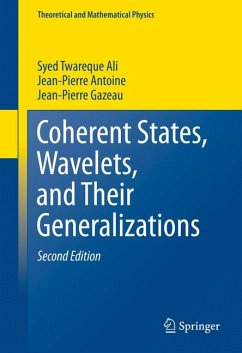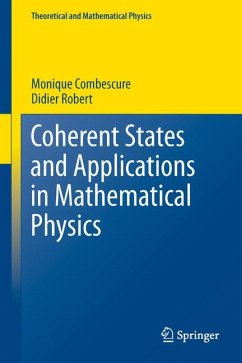
Coherent States, Wavelets, and Their Generalizations (eBook, PDF)
Versandkostenfrei!
Sofort per Download lieferbar
112,95 €
inkl. MwSt.
Weitere Ausgaben:

PAYBACK Punkte
56 °P sammeln!
This second edition is fully updated, covering in particular new types of coherent states (the so-called Gazeau-Klauder coherent states, nonlinear coherent states, squeezed states, as used now routinely in quantum optics) and various generalizations of wavelets (wavelets on manifolds, curvelets, shearlets, etc.). In addition, it contains a new chapter on coherent state quantization and the related probabilistic aspects. As a survey of the theory of coherent states, wavelets, and some of their generalizations, it emphasizes mathematical principles, subsuming the theories of both wavelets and co...
This second edition is fully updated, covering in particular new types of coherent states (the so-called Gazeau-Klauder coherent states, nonlinear coherent states, squeezed states, as used now routinely in quantum optics) and various generalizations of wavelets (wavelets on manifolds, curvelets, shearlets, etc.). In addition, it contains a new chapter on coherent state quantization and the related probabilistic aspects. As a survey of the theory of coherent states, wavelets, and some of their generalizations, it emphasizes mathematical principles, subsuming the theories of both wavelets and coherent states into a single analytic structure. The approach allows the user to take a classical-like view of quantum states in physics.
Starting from the standard theory of coherent states over Lie groups, the authors generalize the formalism by associating coherent states to group representations that are square integrable over a homogeneous space; a further step allows one to dispense with the group context altogether. In this context, wavelets can be generated from coherent states of the affine group of the real line, and higher-dimensional wavelets arise from coherent states of other groups. The unified background makes transparent an entire range of properties of wavelets and coherent states. Many concrete examples, such as coherent states from semisimple Lie groups, Gazeau-Klauder coherent states, coherent states for the relativity groups, and several kinds of wavelets, are discussed in detail. The book concludes with a palette of potential applications, from the quantum physically oriented, like the quantum-classical transition or the construction of adequate states in quantum information, to the most innovative techniques to be used in data processing.
Intended as an introduction to current research for graduate students and others entering the field, the mathematical discussion is self-contained. With its extensive references to the researchliterature, the first edition of the book is already a proven compendium for physicists and mathematicians active in the field, and with full coverage of the latest theory and results the revised second edition is even more valuable.
Starting from the standard theory of coherent states over Lie groups, the authors generalize the formalism by associating coherent states to group representations that are square integrable over a homogeneous space; a further step allows one to dispense with the group context altogether. In this context, wavelets can be generated from coherent states of the affine group of the real line, and higher-dimensional wavelets arise from coherent states of other groups. The unified background makes transparent an entire range of properties of wavelets and coherent states. Many concrete examples, such as coherent states from semisimple Lie groups, Gazeau-Klauder coherent states, coherent states for the relativity groups, and several kinds of wavelets, are discussed in detail. The book concludes with a palette of potential applications, from the quantum physically oriented, like the quantum-classical transition or the construction of adequate states in quantum information, to the most innovative techniques to be used in data processing.
Intended as an introduction to current research for graduate students and others entering the field, the mathematical discussion is self-contained. With its extensive references to the researchliterature, the first edition of the book is already a proven compendium for physicists and mathematicians active in the field, and with full coverage of the latest theory and results the revised second edition is even more valuable.
Dieser Download kann aus rechtlichen Gründen nur mit Rechnungsadresse in A, B, BG, CY, CZ, D, DK, EW, E, FIN, F, GR, HR, H, IRL, I, LT, L, LR, M, NL, PL, P, R, S, SLO, SK ausgeliefert werden.













